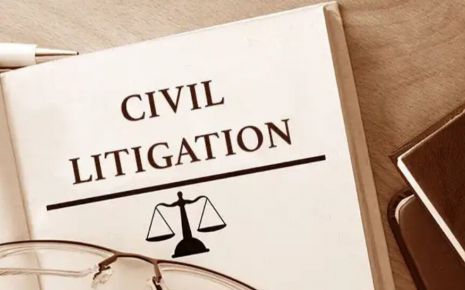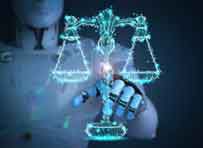Principles Of Natural Justice: Establishing A System Of Fairness
The Principles of Natural Justice are fundamental legal theories established to
guarantee justice and fairness in judicial, quasi-judicial, administrative,
quasi-administrative and processes. These ideas serve as the foundation of a
fair legal system, guaranteeing an impartial decision-making process and
offering protections against arbitrary behaviour. Principles of Natural Justice
contain more than just fairness and procedure; they also include some rules and
principles that are essential for any democratic country.
Rules of Natural Justice:
Principles of Natural Justice:
Definitions:
Purpose Of The Principles:
Hearing Rule:
The first and most important is the Hearing Rule, which states that the decision-making body must ensure that all parties involved in a dispute or legal proceedings are given a fair opportunity to be heard before reaching a decision or judgement. This ensures that no decision is made without allowing one of the parties to voice their opinions.
For Eg: Mr. A is accused of doing wrong. Mr. A is denied an opportunity to defend himself. It would be an unfair and unjust circumstance.
Bias Rule:
This is the second rule. Decisions regarding the disputes or legal proceedings must be made based solely on the facts and merits of the case, without regard to any other considerations. This means that the decision-making authority cannot be unjustly biased in Favor of the interests of any one specific party to the dispute and must remain impartial toward both parties.
For Eg: Mr. P is a judge and has a personal interest in a case, it leads to personal bias. This bias arises from relationships or prior involvement in the matter. Personal bias affects the fairness of decision-making. So, the decision made by Mr. P will be void.
Rule of Speaking Orders or Reasoned Decisions:
The Rule of Speaking Orders, also known as Reasoned Decisions, is the third basic principle of natural justice that has been developed recently by courts and other legal researchers, despite the fact that English law only recognizes the first two rules. According to the natural justice principle, the person or judge deciding must provide detailed, reasonable, and legally acceptable rulings so that the parties affected by them can understand the reasoning behind them. If the decision needs to be appealed, the judge presiding over the appeal will also be able to understand the previous authority's decision-making process.
For Eg: Restricting someone's legal rights requires thoughtful consideration.
The decision made it clear that, even though there is no law deciding the minimal process that quasi-judicial and administrative bodies must adhere to when making decisions, they must still follow the natural justice principles because those decisions apply to people's rights.
"Natural Justice principles imply the minimally fair process that must be followed while exercising decision-making authority. Natural Justice is a civilization's fundamental foundation component[6].
Components:
Fair Trial Principles
Reasoned Decisions Or Speaking Orders:
The Reasoned Decisions or Speaking Orders. Decisions made by judges and other authorities should be thoroughly and clearly explained. It is essential to the legal system's impartiality, accountability, and openness.
Speaking orders require judges to express their reasoning. The statutes that the judges relied on to reach their conclusion are also explained. This fulfils the natural justice principle.
Choosing logically offers several benefits. It assists parties in understanding how their rights have been affected and whether the ruling was just. They can also appeal the outcome if necessary. Reasoned decisions strengthen public confidence in the legal system. It illustrates that rules and reason rather than prejudice are the foundation for judgments.
Speaking orders affect society in a deeper manner as well. They assist in formulating future legal norms and making decisions that are consistent. They also provide for decision evaluation and criticism. By doing this, the legal system's credibility is preserved.
In the English case of Ridge v. Baldwin, the court ruled that the authority's judgment was null and void due to a violation of the legislation providing a fair hearing.
In India, it is a well-established standing that an order that violates the natural justice principles is null and void.
The judiciary has embraced and adhered to natural justice principles in order to defend public rights from the arbitrary actions of the administrative authorities. It is evident that fairness is a part of the natural justice rule as they both encourage and preserve fair dealing. Therefore, if any authority is delegated during the process, it is not solely accepted as part of the judicial role; rather, the principal's primary goal is to avoid an injustice from occurring. One must keep in mind that the principles of natural justice are necessary for any administrative settlement to be held valid since it is essential to note that any judgment or order that breaches these standards will be deemed null and void.
The applicability of the natural justice principle is not limited to walls; rather, it is dependent upon the features of the jurisdiction, the powers granted to the administrative body, and the types of rights that are impacted for each individual.
End-Notes:
Rules of Natural Justice:
- Hearing Rule,
- Bias Rule
- Rule of Speaking orders or Reasoned Decisions.
Principles of Natural Justice:
- Nemo Judex in Causa Sua,
- Audi Alteram Partem,
- Reasoned Decision.
Meaning Of Natural Justice:
- Natural Justice implies Justice, equity, good conscience, fairness, reasonableness, and equality.
- Principles of Natural Justice is derived from the word 'Jus Natural' of the Roman Law. It is related to common law and moral principles. It is not a codified law.
- It is a natural law that doesn't originate from any statute or constitution. Natural Justice refers to superior procedural norms that judges have laid down and that all administrative agencies are bound to while making decisions that have an adverse effect on an individual's rights.
- Aim: The aim of these principles is to give correct and proper decisions to everyone.
- Natural Justice is an ancient concept that traces back a long time ago. The Greeks and Romans were as well familiar with this idea.
- In the days of Kautilya, Artha shastra, and Adam were acknowledged as the concept of natural justice.
- The Bible claims that after Eve and Adam consumed the fruit of knowledge, God prohibited them from doing so. Eve was given a fair opportunity to defend himself before the punishment was passed down, and Adam received the same procedure.
- "Natural Justice is a knowledge of wrong and right". If it is wrong, then in which point of view it should be viewed. If it is right, then how it should be viewed and applied. This is known as principles of natural justice.
- In India, this concept was presented at an early time.
- Case: Mohinder Singh Gill v. Chief Election Commissioner: The Court held that the concept of fairness should be in every action whether it is judicial, quasi-judicial, administrative, and quasi-administrative.
Meaning Of Natural Justice:
- Natural Justice implies Justice, equity, good conscience, fairness, reasonableness, and equality.
- Principles of Natural Justice is derived from the word 'Jus Natural' of the Roman Law. It is related to common law and moral principles. It is not a codified law.
- It is a natural law that doesn't originate from any statute or constitution. Natural Justice refers to superior procedural norms that judges have laid down and that all administrative agencies are bound to while making decisions that have an adverse effect on an individual's rights.
- Aim: The aim of these principles is to give correct and proper decisions to everyone.
- Natural Justice is an ancient concept that traces back a long time ago. The Greeks and Romans were as well familiar with this idea.
- In the days of Kautilya, Artha shastra, and Adam were acknowledged as the concept of natural justice.
- The Bible claims that after Eve and Adam consumed the fruit of knowledge, God prohibited them from doing so. Eve was given a fair opportunity to defend himself before the punishment was passed down, and Adam received the same procedure.
- "Natural Justice is a knowledge of wrong and right". If it is wrong, then in which point of view it should be viewed. If it is right, then how it should be viewed and applied. This is known as principles of natural justice.
Concept Of Fairness:
- In India, this concept was presented at an early time.
- Case: Mohinder Singh Gill v. Chief Election Commissioner: The Court held that the concept of fairness should be in every action whether it is judicial, quasi-judicial, administrative, and quasi-administrative.
Definitions:
- Lord Esher M.R: According to him Natural Justice means "the natural sense of what is right and what is wrong. Later, he has defined natural justice as "fundamental justice".
- Lord Parker: He defined it as "duty to act fairly". Here duty means a duty in which one has to act fairly (for example: Judge has a duty to act fairly while deciding a case, or any officer who has a duty to act fairly while performing any act).
- Mr. Justice Bhagwati: Has taken it as "fair play in action" which means in any action there must be fair play fairly.
Purpose Of The Principles:
- Equal opportunity of being heard.
- Concept of fairness.
- To eliminate the gaps and loopholes of the law.
- Basic Features of the Constitution.
- Protection of Fundamental Rights.
- There has been no injustice done[1].
- Hearing Rule
- Bias Rule
- Rule of Speaking Orders or Reasoned Decisions[2]
Hearing Rule:
The first and most important is the Hearing Rule, which states that the decision-making body must ensure that all parties involved in a dispute or legal proceedings are given a fair opportunity to be heard before reaching a decision or judgement. This ensures that no decision is made without allowing one of the parties to voice their opinions.
For Eg: Mr. A is accused of doing wrong. Mr. A is denied an opportunity to defend himself. It would be an unfair and unjust circumstance.
Bias Rule:
This is the second rule. Decisions regarding the disputes or legal proceedings must be made based solely on the facts and merits of the case, without regard to any other considerations. This means that the decision-making authority cannot be unjustly biased in Favor of the interests of any one specific party to the dispute and must remain impartial toward both parties.
For Eg: Mr. P is a judge and has a personal interest in a case, it leads to personal bias. This bias arises from relationships or prior involvement in the matter. Personal bias affects the fairness of decision-making. So, the decision made by Mr. P will be void.
Rule of Speaking Orders or Reasoned Decisions:
The Rule of Speaking Orders, also known as Reasoned Decisions, is the third basic principle of natural justice that has been developed recently by courts and other legal researchers, despite the fact that English law only recognizes the first two rules. According to the natural justice principle, the person or judge deciding must provide detailed, reasonable, and legally acceptable rulings so that the parties affected by them can understand the reasoning behind them. If the decision needs to be appealed, the judge presiding over the appeal will also be able to understand the previous authority's decision-making process.
For Eg: Restricting someone's legal rights requires thoughtful consideration.
When Is It Eligible For Claim?
When functioning in a judicial or quasi-judicial ability, such as in panchayats and tribunals, etc., natural justice may also be claimed. It covers the idea of justice, fundamental principles of morality, and a variety of prejudices. It also explains why natural justice is necessary and lists any particular circumstances or scenarios in which its principles are not applicable[3].Importance Of The Function:
- Administrative Action.
- Civil Consequence.
- The legitimate exception doctrine.
- Fairness in action.
- Disciplinary Action.
- Case: High water mark case- Eurasian equipment and company limited vs. State
of West Bengal
In this case, all the executive engineers were blacklisted. The Supreme Court ruled that one cannot place someone on a blacklist without providing a valid and appropriate foundations, and that person also deserves a fair chance to be heard[4].
Principles Of Natural Justice
Nemo Judex In Causa Sua
Audi Alteram Partem
Reasoned Decision[5]
The decision made it clear that, even though there is no law deciding the minimal process that quasi-judicial and administrative bodies must adhere to when making decisions, they must still follow the natural justice principles because those decisions apply to people's rights.
"Natural Justice principles imply the minimally fair process that must be followed while exercising decision-making authority. Natural Justice is a civilization's fundamental foundation component[6].
Nemo Judex In Causa Sua Or Rule Against Bias
- According to this principle, no one has the authority to be a judge in their own case. This keeps the proceeding free from bias and Favor. It cannot be in the judge's authority, or body's best interests to decide the matter. If this happens, it would be damaging to an individual's right to due process since the relevant authority could become involved due to financial gain, personal relationships, rivalry, or hatred. This virtually removes the condition that justice must be carried out effectively.
- A biased act is one that, whether intentionally or unintentionally, results in unfair behaviour against a party or a specific case. This rule is therefore necessary to ensure that the judge is unbiased and delivers a decision based on the evidence that has been recorded in accordance with the case[7].
- Case: A.K Kraipak vs. Union of India:
The ruling of a quasi-judicial body was overturned by the higher court due to its violation of the natural justice principle. The lawsuit concerns the appointment of Forest Department workers for the State of J&K to the Indian Forest Service. One of the candidates for the position was on the selection committee. As a result, the court invalidated the selection by declaring in the case that "you cannot be the judge of your own[8].
- Case: Baidyanath Mohapatra vs. State of Orissa:
At the age of fifty, a government employee was prematurely retired. One of the members of the committee that made the retirement decision went on to chair the tribunal where the case was filed. The decree of premature retirement was validated by the tribunal. The Supreme Court subsequently declared that the tribunal's decision was wrong because the member who shared commonalities with both the committee and the tribunal was regarded as having an interest in the case, which went against the natural justice principle and ruled the tribunal's decision unlawful[9].
Kinds Of Bias:
- Personal Bias:
A party's relationship with the decision-making authority gives rise to personal bias. It led the decision-making body in a questionable circumstance to act unfairly and give a decision that benefited him/her. These kinds of equations result from a variety of interactions between people.
To effectively contest the administrative action on the bias of personal prejudice, one must provide a valid justification for their bias.
- Pecuniary Bias:
Administrative authority will become biased if any member of the judicial body receives any form of financial gain, no matter how small.
- Subject matter Bias:
Subject matter bias occurs when the decision-maker has prior strong opinions or biases regarding any given topic or subject.
This may influence a choice. As a result, one is unable to maintain impartiality and justice.
- Departmental Bias:
Every administrative procedure has departmental bias, which is a problem that is frequently overlooked and that, when it does, will cause the proceeding's negative notion of fairness to disappear.
- Policy notion Bias:
Preconceived policy notion-related issues are a very serious matter. The individuals seated there don't think the judges will decide on a case after a fair trial by sitting down with a blank piece of paper.
- Bias on the account of the obstinacy:
The Supreme Court's unreasonable condition has led to the discovery of new bias criteria. This new category resulted from an appeal in which a Calcutta High Court judge maintained his own decision. The fact that a judge cannot sit in appeal against his own case is a clear violation of the principles of bias.
Audi Alteram Partem Or Hear The Other Party Or The Rule Of Fair Hearing Or The Rule That No One Should Be Condemned Unheard·
- It consists of three words. In basic terms, it says that no one can be
punished or found guilty by the court without first having a fair
opportunity to be heard.
In numerous jurisdictions, the majority of cases remain unresolved without receiving a fair opportunity to be heard. - This rule literally means that a fair trial should be held and that each party should be given an equal opportunity to present themselves and any evidence that is relevant.
- This important natural justice principle basically says that no one should be punished unjustly. A person should be made aware of all the charges ahead of time so that he can prepare and understand them all.
Components:
Fair Trial Principles
-
Issuance of notion:
- Case: Fazal Bhai vs. Custodian: In order to start with the fair trial method procedure, valid and adequate notice must be made to the required parties in the matter. Notice will be given even if the statute does not require it to be issued, and it will be given before decisions are made. This took place in the above-mentioned case[14].
- Case: Kanda vs. Government of Malaya: In this case, The court ruled that notice must expressly and clearly state the facts, circumstances, and issue of bias that calls for action to be done. Individuals have the right to self-defence, so he should be knowledgeable about the relevant information so he can refute the claim and protect his own interests. The notice ought to address the accusations made against the defendant and the upcoming trial. He cannot be punished for any other offenses; only the ones listed in the notice are grounds for punishment[15].
-
Right to present the case and evidence:
One must be given a fair amount of time to get ready and effectively deliver his argument after getting the notice. Refusals based on arbitrary or irrational grounds should not be accepted.
-
Right to Cross Examination:
The ability to cross-examine the parties' statements is part of the right to a fair hearing. Tribunals would be in violation of natural justice principles if they refused to allow cross-examination. Additionally, all required copies of the documents must be provided; otherwise, the principle will also be violated. Officers involved in the investigation process should be made available by the department so they can cross-examine witnesses.
-
Right of Legal representative:
Case: Sanghi textile processor vs. Commissioner
Every party has the right to a legal representative during the inquiry process. Nobody will be able to argue with whether the legally qualified individual presents to each party (A.K. Roy). Likewise, even in the event that an adjudication hearing is being conducted by an investigative officer, the department reserves the authority to assign its officer[16].
Exceptions:
- Emergence Period
- Public Interest
- Express statutory clause
- If the nature of the case is not serious
- If it does not affect/damage the status of the individual
Significance Of The Audi Alteram Partem:
- Protection of individual rights: A crucial instrument in preserving individual rights is the fair hearing rule. It guarantees that no one is taken from their life or liberty without first having the chance to make their case[17].
- Due process and procedural fairness: They guarantee that each decision is decided upon after giving it thoughtful consideration.
- Legal system trust: The fair hearing standard encourages public confidence in the legal system. People are more willing to have faith in the fairness and integrity of the process and its results when they feel sure that their voices have been heard.
- Fair hearings ensure a just process, preventing the arbitrary use of power. It excludes personal preferences and biases of any kind.
- Respecting the fundamentals of natural justice: The right to a fair trial is one of the foundations of natural justice. It upholds the principles of fairness, equality, and the right to be heard. A just legal system has to stick to these values.
Reasoned Decisions Or Speaking Orders:
The Reasoned Decisions or Speaking Orders. Decisions made by judges and other authorities should be thoroughly and clearly explained. It is essential to the legal system's impartiality, accountability, and openness.
Speaking orders require judges to express their reasoning. The statutes that the judges relied on to reach their conclusion are also explained. This fulfils the natural justice principle.
Choosing logically offers several benefits. It assists parties in understanding how their rights have been affected and whether the ruling was just. They can also appeal the outcome if necessary. Reasoned decisions strengthen public confidence in the legal system. It illustrates that rules and reason rather than prejudice are the foundation for judgments.
Speaking orders affect society in a deeper manner as well. They assist in formulating future legal norms and making decisions that are consistent. They also provide for decision evaluation and criticism. By doing this, the legal system's credibility is preserved.
- Via significant rulings, Indian courts have highlighted the significance
of issuing instructions. Reasoned rulings are essential especially in
matters involving basic rights, according to the Supreme Court. Courts hold
that receiving a reasoned decision is an essential component of a fair
trial. A fair trial is guaranteed by Article 21 of the Constitution as well.
- Speaking orders have a place outside of the courtroom. However, quasi-judicial and administrative entities ought to employ them as well. Fair treatment and due process are guaranteed by speaking orders, an administrative law principle of natural justice. These organizations have authority over individuals' rights. When they make choices, they must remain impartial and open.
- Grounds Of The Reason Decisions Or Speaking Orders:
- The party who feels wronged has the opportunity to show the appellate and revisional courts why they have the right to reject it.
- It is an admissible component of the party that the decision is made against.
- Reasons must be recorded in order to prevent the executive authority's court system from acting arbitrarily[18].
- Applicability Of The Principles Of Natural Justice:
- Court- except to ex-parte
- Tribunals
- Authority entrusted with discretion but subject to legal limitations.
Principles Of Natural Justice And Constitution Of India
The Indian Constitution does not specify the concepts of natural justice. These are essential to the idea of an impartial legal system. The fundamental rights are the source of these concepts.- Article 14 of the Constitution states that everyone has the right to equal protection under the law and equality before the law. Natural justice is the foundation for this.
- Right to Life and Personal Liberty (Article 21): These rights are protected by the Constitution. In this article, the judiciary included the right to a fair trial.
- Protection against arrest and custody in certain cases (Article 22): It includes the right to know the reason(s) for the arrest. It includes the freedom to speak with any lawyer of one's choosing. It also covers the right to appear before a magistrate within twenty-four hours following an arrest.
- Separation of judiciary from the executive (Article 50): This article instructs the state to keep the judicial and executive departments apart. This guarantees the judiciary's ability to operate impartially and independently. The executive branch should not have any influence over the judiciary.
- Case: Maneka Gandhi vs Union of India (1978): The Court's ruling in this case established that the freedom to travel overseas is a component of the right to personal liberty. The court stressed how crucial it is to give people a chance to be heard before acting[19].
- Case: A.K. Kraipak vs Union of India (1969): Having an unbiased, independent decision-making body is crucial. The court determined that natural justice depends on an exemption against bias. It was said that decision-making power had to be impartial and unaffected by personal interests[20].
Exceptions To The Principles Of Natural Justice
- Exclusion by statutory provisions.
- Exclusion by the constitutional provisions.
- Exclusion in case of legislative act.
- Exclusion in public interest.
- Exclusion in case of the need of prompt action or in emergency or necessity.
- Exclusion on the ground of the impracticability.
- Exclusion in case of confidentiality.
- Exclusion in cases of academic adjudication.
- Exclusion when no right of the person is infringed.
- Exclusion in the cases of interim prevention action.
- Exclusion in case of fraud.
Impact For The Violation Of The Principles Of Natural Justice
The usual judicial view is that an order is null and void when the authority is supposed to follow the natural justice principle when passing it, but they don't.In the English case of Ridge v. Baldwin, the court ruled that the authority's judgment was null and void due to a violation of the legislation providing a fair hearing.
In India, it is a well-established standing that an order that violates the natural justice principles is null and void.
- Absence of justification: The order is revoked and the authority
is instructed by the court to reconsider the situation if the decision's
rationale is not communicated to the parties involved or to the court. In
certain instances, the court has upheld the action when the reasons are not
disclosed to the individual in question and are documented; nevertheless, in
other instances, the court has not upheld the action.
- Case: Ajantha Industries vs Central Board of Direct Taxes: The court has ruled
that the grounds recorded on the file are insufficient. Giving the person in
question reasons is essential. In this instance, the order was overturned on the
grounds that the party in question was not informed of the reasons. It seems
that the perspective presented in the Ajantha Industries case is the more
accurate one. Reasons shouldn't be kept in the record or file; instead, they
should be shared with the person in question since they are for their
benefit[21].
The judiciary has embraced and adhered to natural justice principles in order to defend public rights from the arbitrary actions of the administrative authorities. It is evident that fairness is a part of the natural justice rule as they both encourage and preserve fair dealing. Therefore, if any authority is delegated during the process, it is not solely accepted as part of the judicial role; rather, the principal's primary goal is to avoid an injustice from occurring. One must keep in mind that the principles of natural justice are necessary for any administrative settlement to be held valid since it is essential to note that any judgment or order that breaches these standards will be deemed null and void.
The applicability of the natural justice principle is not limited to walls; rather, it is dependent upon the features of the jurisdiction, the powers granted to the administrative body, and the types of rights that are impacted for each individual.
End-Notes:
- S.P. Sathe, Administrative Law, 187-192 (1970).
- Law Octopus, https://lawctopus.com (accessed in December 2023).
- SP Sathe, Administrative Law, 188 (1970).
- Erusian Equipment & Chemicals Ltd vs State Of West Bengal & Anr,1975 AIR 266, 1975 SCR (2) 674, AIR 1975 SUPREME COURT 266, (1974).
- S.P. Sathe, Administrative Law, 192-208 (1970).
- Indian Kanoon, https://indiankanoon.org (accessed in December 2023).
- Northeast Law Journal, https://www.northeastlawjournal.com (accessed in January 2024).
- A. K. Kraipak & Ors. Etc vs Union Of India & Ors, AIR 1970 SUPREME COURT 150, (29 April, 1969).
- Indian Kanoon, https://indiankanoon.org (accessed in January 2024).
- Nios, https://nios.ac.in (accessed in January 2024).
- Ramanand Prasad Singh & Anr vs Union Of India & Ors, 1996 SCC (4) 64, JT 1996 (4) 39, AIRONLINE 1996 SC 1060, (1996).
- Indian Kanoon, https://indiankanoon.org (accessed in January 2024).
- 1954CRILJ1062, AIR 1954 MADHYA BHARAT 125.
- 1961 AIR 1397, 1962 SCR (1) 456.
- Indian Kanoon, https://indiankanoon.org (accessed in January 2024).
- 1993ECR226(AP), 1991(55) ELT151(AP).
- Law Octopus, https://lawctopus.com (accessed in February 2024).
- Northeast Law Journal, https://www.northeastlawjournal (accessed in February 2024).
- 1978 AIR 597, 1978 SCR (2) 621
- AIR 1970 SUPREME COURT 150
- 1976 AIR 437, 1976 SCR (2) 884.
Award Winning Article Is Written By: Ms.G.V.L. Prashasti
Authentication No: MY413348094640-12-0524
Law Article in India
Legal Question & Answers
Lawyers in India - Search By City
LawArticles
How To File For Mutual Divorce In Delhi

How To File For Mutual Divorce In Delhi Mutual Consent Divorce is the Simplest Way to Obtain a D...
Increased Age For Girls Marriage

It is hoped that the Prohibition of Child Marriage (Amendment) Bill, 2021, which intends to inc...
Facade of Social Media

One may very easily get absorbed in the lives of others as one scrolls through a Facebook news ...
Section 482 CrPc - Quashing Of FIR: Guid...

The Inherent power under Section 482 in The Code Of Criminal Procedure, 1973 (37th Chapter of t...
The Uniform Civil Code (UCC) in India: A...

The Uniform Civil Code (UCC) is a concept that proposes the unification of personal laws across...
Role Of Artificial Intelligence In Legal...

Artificial intelligence (AI) is revolutionizing various sectors of the economy, and the legal i...









Please Drop Your Comments